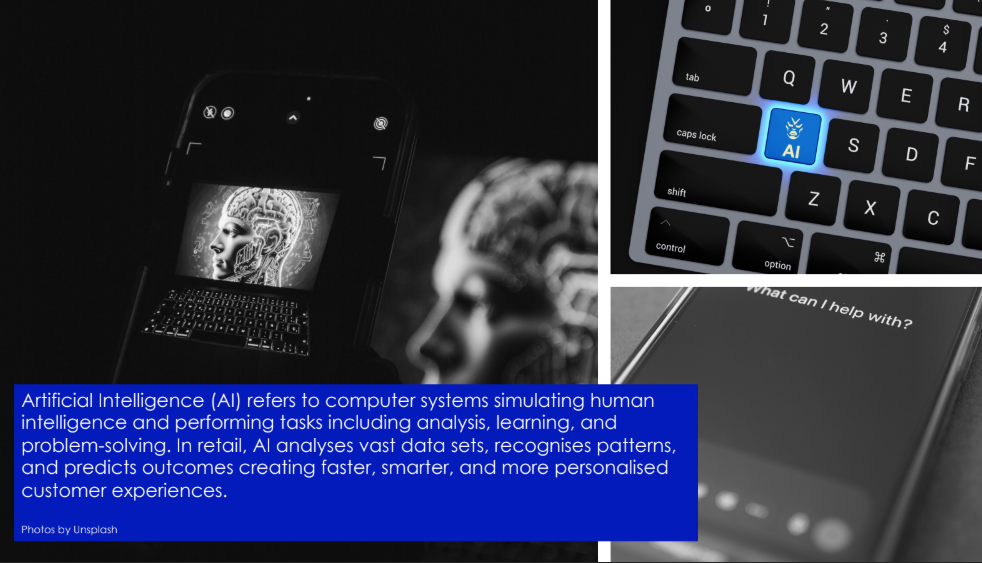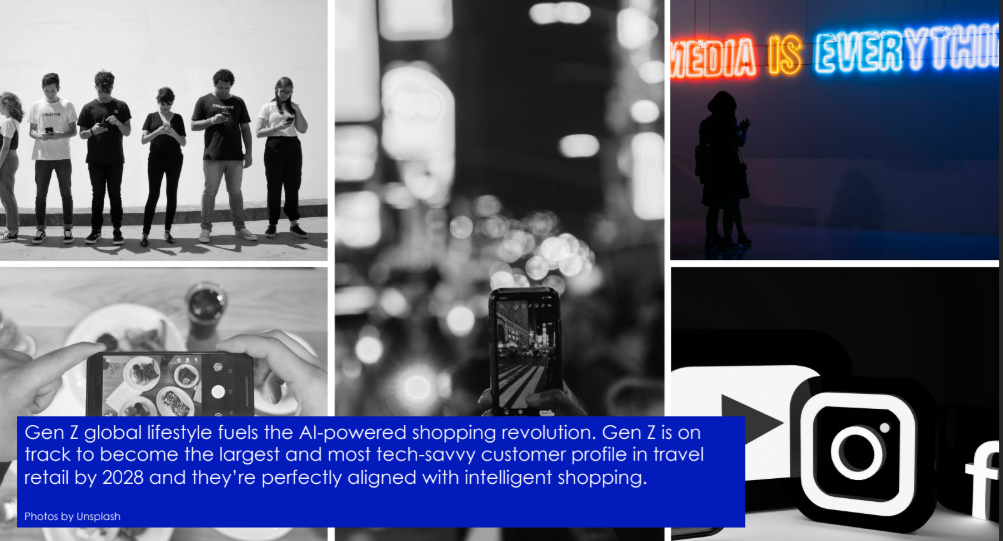September 24, 2025
Blueprint Analysis: AI transforms airport shopping by 2030
“AI is the ultimate game changer in travel retail; it will fundamentally transform the airport shopping experience” says Blueprint Partner Thomas Kaneko Henningsen

Artificial Intelligence (AI) is “the ultimate game changer in travel retail; it will fundamentally transform the airport shopping experience”. That’s according to Blueprint Partner Thomas Kaneko Henningsen.
A Blueprint analysis notes the global AI market is projected to generate US$1,811,75 billion by 2030 and McKinsey estimates AI could generate between US$400 – 660 billion annually for retail and consumer goods companies by 2030.
Digitalization has already transformed how travelers shop. The combination of ecommerce leveraging intelligent product search engines together with smartphones equipped with AI have become global shopping platforms available 24/7. This fast-paced tech development threatens airport shopping unless this marketplace evolves. In the unique airport environment, AI’s potential is unprecedented, according to Blueprint.
The Copenhagen-based travel retail consultancy tracks how global megatrends including AI technology, Gen Z, experience-driven shopping, wellness and wellbeing, sustainability and geopolitics transform the travel retail marketplace.

Why AI Matters Now
AI is no longer an evolution; it is a revolution. The technology is accelerating faster than most anticipated. Today’s AI systems now analyze and predict consumer behavior in real-time, unlocking new levels of agility and relevance in the airport experience space.
According to Forbes traditional consumer behavior is shifting dramatically as AI-powered shopping is on the rise:
• 51% of global shoppers now use AI for price checking, 45% for product inquiries, and 41% for budget shopping.
• 86% of adults worldwide want AI to help with product research or information.
• In 2024, over 91% of global shoppers expected AI to personalize recommendations within the next two years.
• 34 million AI-generated images created daily.
• 71% of social media images are now AI-generated.
As these trends converge, Blueprint predicts a dramatic increase in AI powered influencers and avatars becoming a powerful new layer of airport shopping the coming years. They won’t just promote products; they will engage travelers personally, speaking their language, understanding their preferences, and guiding them through tailored experiences in real time. Imagine arriving at an airport where a digital brand ambassador greets you, helps you navigate the terminal environment while suggesting the perfect gifts for your destination.
This is already emerging: during the global pandemic Incheon Airport pressed ahead with AI, biometrics and technology-driven operational efficiency, Munich Airport pioneers the digital travel experience including autonomous robotics while L’Oréal has partnered with Nvidia to leverage AI-powered marketing campaigns and 3D product visualization.
What today feels experimental will soon feel essential, transforming airports into stages where digital personalities build emotional equity, inspire purchases, and make shopping feel less transactional and more connected.
Predictive Power: AI Understands the Airport Shopper
AI profiles shoppers in real-time. By analyzing flight data, nationality, dwell time and more, retailers may predict what traveler profiles want before they even step into the airport terminal. As travelers enter shopping areas, AI enables sentiment and emotion analysis; gauging mood, whether the traveler is satisfied, rushed, relaxed, or ready to indulge, providing retailers with enhanced insight into potential to spend.
ARI, one of the world’s most dynamic travel retailers, is taking strides is this space, with some major projects underway to integrate AI to enhance functionality and efficiencies. The aim is to establish an “AI center of excellence” to drive this forward in business operations.

ARIME’s Head of Planning & Design Tracy Ross comments, “AI is redefining how we the retailers, understand our customer better, through the gathering of enhanced personalized data collection and in return, providing more actionable insights, that empower us to present our customer with a more personalized offer, more exciting experiences and an advanced means of interacting with us. Thereby unlocking a new, symbiotic travel retail journey, that begins with the pre-travel connection.
“I believe AI is impacting not only Gen Z’s but across the other age groups as well, as individuals realize the power behind AI and the ability to enhance day to day outputs and decision making. The greater the data input and the more AI models understand those inputs, the more personalized the outputs – this ‘personalization’ is where the strength of AI lies and therein great opportunity for retailers to tap into, from pre-travel, through to in-store and post-journey experiences” she adds.

AI-powered Airport Shopping 2030: Responsive, not reactive
Ross and Kaneko-Henningsen predict how AI will transform the airport shopping experience the coming years:
In-Terminal Space Management
AI designs in-terminal layouts based on lessons learned from the best performing airport terminals. Journey Mapping From check-in to gate, AI maps track passenger movement, touchpoints and time spent across the terminal and within retail areas, help to predict when and where travelers are most likely to browse, engage, and for how long.
Voice & Visual Wayfinding
Through AI multilingual voice recognition, and AI-generated terminal and store maps combined with visual guides, passengers instantly locate desired products and services. This option facilities people with disabilities.
In-Store Category Management
AI optimizes space allocation and inventory levels while cross-referencing this with individual product performance.
Predicting Consumer Behavior
AI is uploaded to existing in-terminal and in-store cameras enabling constant and accurate tracking of how customers navigate retail environments. It’s capable of predicting shopping behavior and even detecting in-store theft in real-time.
Dynamic Pricing
AI enables real-time pricing to respond to stock levels, flight delays, and in-terminal customer flows automatically pushing relevant promotions at the right time.
Hyper-Personalized Product Discovery
AI-generated assistants tailor offers based on customer data, interests, dietary restrictions, even emotional cues creating in-the-moment relevance.
Sustainability Signals
As more shoppers seek sustainable product offerings, interactive AI Sustainability Ambassadors showcase and recommend eco-conscious options to travelers, thereby reinforcing retailer transparency and trust.
AI-Enhanced Sales Staff
Equipped with AI-powered assistants, in-store sales staff gain live insights into customer profiles, product performance, digital loyalty clubs, recommended upsells while storing selection on personal apps for future reference. AI enhances human-to-human service, it doesn’t replace it.
Operational Insights
By collaborative merging of airport operations with retail data, AI foresees congestion points and can recommend the adjustment of staffing, merchandising and layout to maximize shopper comfort. It can identify low stock areas and trigger replenish alerts.
Predictive Checkout & Flow Management
AI provides frictionless and contactless checkouts, predicting bottlenecks and customizes promotions to drive in-store conversation and footfall.
Experiential Retail Zones
Augmented reality (AR) mirrors, AI-curated pop-ups, scent simulations, and phygital storytelling turn airports into high-sensation discovery spaces.
AI-powered Influencers
‘Virtual creators’ shape the perception of airports. These AI-generated characters are designed to mimic human influencers on social media and come equipped with lifelike features, scripted emotions, and personalities.
“By 2030, the competitive divide in airport retail won’t be between big and small hubs; it will be between those who leverage AI to optimize personalized, engaging shopping journeys and those who don’t,” Kaneko Henningsen adds
“We will see airport shopping evolve from transaction-based to experience-driven to hyper-personalized relations. It will feel like relevance delivered exactly when and where experience-hungry travelers need it.”
“I don’t believe we should be waiting for 2030 - if Travel Retailers haven’t already laid AI foundations and started weaving AI into the retail expedience and operational procedures by the end of 2026, they may have missed the AI boat, due to the speed at which AI is evolving. And finally, AI is here to enhance not replace the human experience,” Ross concludes.




